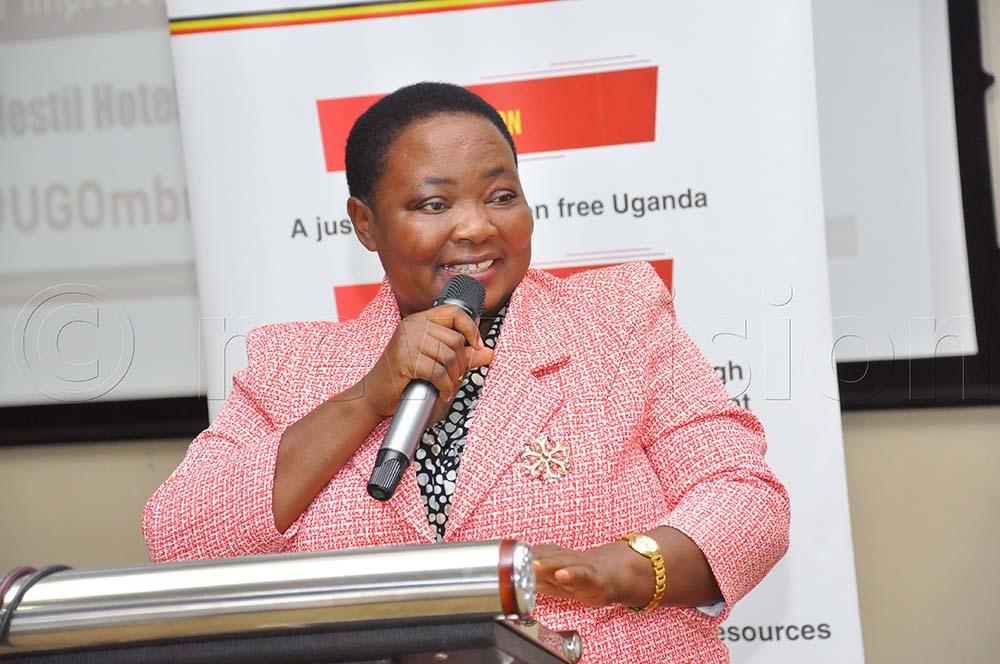Govt officials frustrating effective implementation of PDM — Nabbanja
Oct 13, 2023
Nabbanja claimed that in some areas, parish chiefs had been demanding bribes and charging PDM recipients various fees, including registration fees, computer use fees, and fees for creating passwords.

Robinah Nabbanja, Prime Minister launching Ombudsman protocol as IGG, Beti Kamya, Rose Akello State Minister for ethics & Wilson Muruli Public Service minister look on. (Photos by Nancy Nanyonga)
Jeff Andrew Lule
Journalist @New Vision
______________________ Robinah Nabbanja the Prime Minister of Uganda addressing participants during the dialogue on commemoration of international ombuds day at Mestile hotel Nsamya Moses Ssentalo Commissioner of Prisons, Justice Geoffrey Kiryabwire and Beti Kamya the Inspector General of Government interacting after the dialogue on commemoration of international ombuds day at Mestile hotel Nsamya
The demand for bribes by some government officials from the targeted Parish Development Model (PDM) programme recipients, continues to ultimately undermine its effective implementation, Premier Robinah Nabbanja has said.
During her recent visits to the areas in greater Mubende, Luwero, and Kibaale as part of the ongoing campaign for farmer mobilisation, education, value-addition, and service delivery, Nabbanja highlighted that certain concerns that impede service delivery were brought up by locals in various places through barazas.
She claimed that in some areas, parish chiefs had been demanding bribes and charging PDM recipients various fees, including registration fees, computer use fees, and fees for creating passwords.
“As a result, the victims of this form of corruption have received less than shillings 1,000,000 which they are entitled to. This is criminal and should stop because it can hinder the implementation and success of PDM, which is our Government’s flagship programme for socioeconomic transformation,” she added.
She emphasized that despite significant government investment in service delivery, some Ugandans are not being served effectively.
She mentioned that on her travels, people had complained about how many agricultural extension workers spent their working hours in the office, playing pool and hanging out in bars rather than helping farmers.
Nabbanja made the remarks on Thursday (October 13, 2023) at the Mestil Hotel in Nsambya, Kampala. This was during the International Ombudsman Dialogue, under the theme: Raising citizen's awareness of the Ombuds role for improved service delivery.
This was part of the events to mark International Ombudsman Day, which is held every October 12.
An ombudsman is an impartial government officer who deals with complaints of administrative injustice and maladministration from the public. Their functions include ensuring accountability, investigating and resolving complaints, and addressing systemic issues.
The Prime Minister stressed that all government officials and political leaders at all levels hold those positions to serve the people.
“Why would people have to pay for services they are meant to get free of charge? Why would a parish chief demand PDM beneficiaries bribes to give them the money that rightly belongs to them? Why would public servants seek to get PDM money, which is only meant for 39% of Ugandans who are outside the money economy? I even found an OC in Kagadi who was enrolling to benefit from PDM. A full OC, can you imagine? This must stop because this programme targets the most vulnerable who are not in the money economy,” Nabbanja said.
Raising awareness
She emphasized the importance of raising public awareness of the Ombudsman's role in improving service delivery, noting that this is one of the strategic interventions in our third National Development Plan and a commitment made by the NRM Government in its manifesto for the years 2021–2026.
She pointed out that despite being the least well-known among Ugandans, the Ombuds role is crucial for fostering fair, effective, good governance and the provision of services to the public.
Nabbanja also launched the Inspectorate of Government (IG) Ombudsman manual to streamline the filing of complaints by both public servants and the public.
The new guidebook, according to Inspector General of Government (IGG) Beti Kamya, has instructions for filing, processing, and reporting complaints.
She emphasized that many Ugandans were ignorant of the IG's ombudsman services and the reporting process for their complaints.
“That is why this procedure is important and we are going to promote using social media to effectively reach as many people as possible,” she added.
During the fiscal year 2022/2023, nearly 5,000 ombudsman cases from various ministries, departments, and agencies (MDAs) were received, according to the IG.
The most common ombudsman issues in MDAs that are resolved are employment disputes (36%), and non-payment of salary and other benefits (29%), while management and delayed delivery of services stood at (08%).
Alternative dispute resolution
To quickly clear the case backlog, Justice Geoffrey Kiryabwire urged all issues to be handled through alternative dispute resolution.
He emphasised that the cornerstone of good governance is service delivery.
“If you have poor service delivery, then you will have an angry population and that is where disputes come from between government and citizens. The ombudsman function should offer a quick remedy to avoid going to courts and hiring expensive lawyers because many cannot afford them,” he noted.
He also urged the IG to always involve citizens in dispute resolution to avoid escalation.
The main requirements for a successful ombudsman job, according to Kiryabwire, are independence, neutrality, confidentiality, and informality.

No Comment